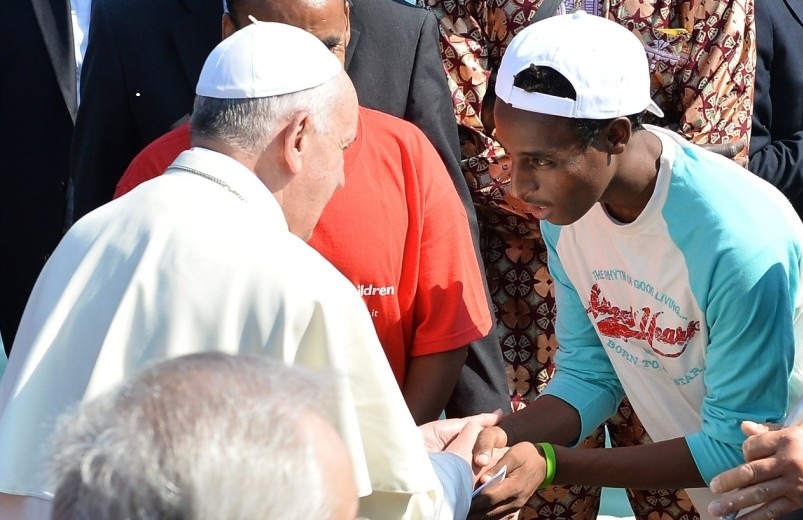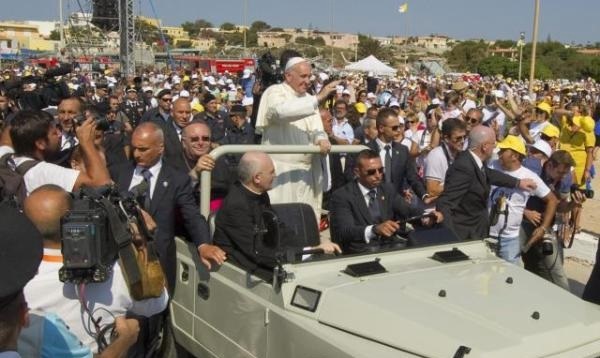Home
|
Prometheus Nr. 191|
Alexander
Order
Papst
Franziskus und die Boat-People von Afrika
Auf
Lampedusa verbreitete der Heilige Vater aus Argentinien Hoffnungen,
die er nicht erfüllen kann.
Von B. John Zavrel

Papst
Franziskus
auf einer schwierigen Mission : Besuch auf der
Mittelmeer-Insel
Lambedusa
bei den Boat-Flüchtlingen aus Afrika.
Von diesen
Migranten fühlen sich Europas Bürger
bedroht.
Daher sind sie gegen die Aufnahme vn Afrikanern in der christlichen
Gesellschaft Europas.
Floto: press-Pool
Rom/Washington
(mea) Papst
Franziskus hat im Juli 2013 einen spektakulären Besuch auf der
italienischen Mittelmeerinsel Lampedusa gemacht und auf das Schicksal
der schwarzafrikanischen Boot-Flüchtlinge aufmerksam gemacht.
Das sind
jene beklagenswerten Menschen, die seit vielen Jahren zu Tausenden
illegal von Afrika nach Europa einwandern
wollen.
Sie sind jedoch von den Bürgern der Europäischen
Gemeinschaft (EU) nicht erwünscht.
Diese
Europäer fühlen sich von einer „Invasion sozialer
Probleme" bedroht. In der Kontroverse wird von Gegnern der
Einwanderung aus Afrika das Beispiel der USA angeführt,
mit einer
strikten Einwanderungspolitik den unkontrollierten Zustrom aus
gewissen Nachbarregionen zu bremsen.
Die Afrikaner drängt es
weiterhin mit aller Gewalt nach Europa. Ihr Argument ist dabei die
„politische Unterdrückung" in ihrer Heimat. Dagegen meinen
die Gegner der unkontrollierten Zuwanderung, dass die Männer
und Jugendlichen fast ausschließlich
„Wirtschaftsflüchtlinge sind". Sie wollen in Ländern
wie Italien, Frankreich, Deutschland und in skandinavischen Staaten
zu Lasten der Europäer leben . Die größte Begierde
der Boat-People gilt dem seit 1945 geographisch zwar kleinem, aber
wirtschaftlich noch starken Deutschland. Eine Destabilisierung
dieses treuen Verbündeten der USA wäre schädlich
für die transatlantische Sicherheit
Papst Franziskus kam von Rom etwa
vier Stunden auf die Insel Lampedusa. Die gute Absicht des Heiligen
Vaters aus Argentinien, auf die Lage der in Italien nach geltendem
Gesetz in Notunterkünften festgehaltenen Afrikaner aufmerksam zu
machen, ist letztlich misslungen. In Internet-Foren kritisierten
Menschen in den betroffenen europäischen Ländern das"
populistische Auftreten" des Papstes als reines Medienspektakel der
katholischen Kirchenführung.
Blumen für
ertrunkene Flüchtlinge
Zu Beginn des Besuchs hatte Papst
Franziskus einen Kranz in das Mittelmeer geworfen. Er nahm diese
Ehrung zum Gedenken an etwa 20.000 Ertrunkene vor, die in den
letzten zwei Jahrzehnten auf ihrer Flucht in das „gelobte Land"
Europa umkamen. Aus Italien wird ferner berichtet: Der Papst hat
auf der Insel Lampedusa an das Elend der dort strandenden oder im
Meer ertrunkenen Migranten erinnert: Ihr Schicksal gehe alle an.
Zugleich kritisierte der Papst auch pauschal die Politik in Europa,
die das humanitäre Problem nicht löse. Franziskus prangerte
die Gleichgültigkeit gegenüber dem Schicksal von Migranten
an.
Diese Selbstdarstellung des Papstes
hat dem Nachfolger des beliebten deutschen Papstes Benedikt XVI.
keine neuen Freunde gebracht. Im Gegenteil: die Kritik an Papst
Franziskus war auch, er habe den Flüchtlingen lediglich Hoffnung
gemacht, ohne jedoch selbst etwas tun zu können. Der Verlauf der
Reise sei eher eine neue Selbstdarstellung des Papstes gewesen. Er
sei als „guter Hirte" zu den Flüchtlingen gekommen, habe
jedoch nur seine Macht im Vatikan demonstrieren wollen. Bei einer
Messe auf dem Sportplatz der Insel waren nach Medienberichten etwa
insgesamt 10.000 Migranten, Inselbewohner und schaulustige Touristen
gekommen. Vor ihnen forderte Franziskus in einer von einem
Manuskript abgelesenen Rede unter anderem die Abkehr von einer
"Globalisierung der Gleichgültigkeit".

Papst
Franziskus
im Papa-Mobil bei den afrikanischen Bootsflüchtlingen.
Mit dabei
waren Inselbewohner und schaulustige
Touristen.
Skeptiker beklagten, dass die „Show des Papstes" den betroffenen
Hilfesuchenden in Wirklichkeit wenig brachte.
Die
Probleme der Schwarzafrikaner müssten in deren
Herkunftsländern gelöst
werden.
Die Ablehnung von Wirtschaftsflüchtlingen in Europa
steigt.
Pope Francis at
Lampedusa: "Forgive us, Lord" for indifference
Die Wirkung der Reise und das agieren
des Papstes bleibt nach Medienberichten umstritten. Die betroffenen
Flüchtlinge, die unter Gefahr für das eigene Leben die
illegale Einreise über das Meer mit Hilfe von "Schlepper-Banden"
geschafft hatten, waren geehrt und glücklich.
Vatikan-Bürger fanden offiziell Lob für den Papst, doch
Kritiker bleiben dabei: Papst Franziskus hat sich mit der Wirkung
seiner Mission als Freund der Armen und Entrechteten
verrechnet.
Positiv sah dagegen Radio Vatikan die
erste Reise des lateinamerikanischen Papstes. Am 9. Juli 2013
verbreitete der Rundfunk des Papstes folgenden Bericht in Englischer
Sprache, den wir in Auszügen wiedergeben:
(Vatican Radio) Pope Francis
travelled on Monday to the tiny Sicilian island of Lampedusa. He
threw a wreath of flowers into the sea to remember the thousands of
migrants who have died making the journey to Italy from Africa. He
then met with several migrants, thanking them for their welcome. The
highlight of the day was a Mass celebrated in the island's sports
stadium, which served as a reception centre for the thousands of
people who fled the upheavals caused by the Arab Spring unrest in
North Africa, as well as refugees from poverty and violence in other
parts of Africa.
Pope Francis said he came to
Lampedusa "today to pray, to make a gesture of closeness, but also to
reawaken our consciences so that what happened would not be
repeated."
He began by greeting the islanders
with the phrase "O' scia'!" a word of greeting in their local
dialect, and thanking them for the work they have done to provide
assistance to the migrants who have found their way to Lampedusa,
saying they offer "an example of solidarity."
He also greeted Muslim migrants who
are about to begin Ramadan.
"The Church is near to you in the
search for a more dignified life for yourselves and for your
families," he said.
The Holy Father wore violet vestments
during the Mass, calling it a "liturgy of repentance."
"God asks each one of us: Where is
the blood of your brother that cries out to me?," Pope Francis said
during his homily, quoting from the Genesis story of Cain and Abel.
"Today no one in the world feels responsible for this; we have lost
the sense of fraternal responsibility."
"The culture of well-being, that
makes us think of ourselves, that makes us insensitive to the cries
of others, that makes us live in soap bubbles, that are beautiful but
are nothing, are illusions of futility, of the transient, that brings
indifference to others, that brings even the globalization of
indifference," he continued. "In this world of globalization we have
fallen into a globalization of indifference. We are accustomed to the
suffering of others, it doesn't concern us, it's none of our
business."
Pope Francis then moved from the Old
Testament to the New Testament, with another story of death caused by
indifference to suffering: the Massacre of the Innocents.
"Herod sowed death in order to defend
his own well-being, his own soap bubble," said the Holy Father. "And
this continues to repeat itself. Let us ask the Lord to wipe out
[whatever attitude] of Herod remains in our hears; let us ask
the Lord for the grace to weep over our indifference, to weep over
the cruelty in the world, in ourselves, and even in those who
anonymously make socio-economic decisions that open the way to
tragedies like this."
Pope Francis then asked for
forgiveness: for the "indifference towards so many brothers and
sisters…for those who are pleased with themselves, who are
closed in on their own well-being in a way that leads to the
anaesthesia of the heart, … for those who with their decisions
at the global level have created situations that lead to these
tragedies. Forgive us, Lord!"
Though the influx of migrants has
slowed since its height at the outbreak of the Arab Spring in 2011,
people nevertheless continue to come. Shortly before the pope arrived
on the tiny island Monday morning, a boat carrying 165 migrants from
Mali made port.
12. 07.3013
Disclaimer: The
contents of this article are of sole responsibility of the author(s).
The journal PROMETHEUS will not be responsible for any inaccurate or
incorrect statement in this article.
www.meaus.com
contains copyrighted material the use of which has not always been
specifically authorized by the copyright owner. We are making such
material available to our readers under the provisions of "fair use"
in an effort to advance a better understanding of political, economic
and social issues. The material on this site is distributed without
profit to those who have expressed a prior interest in receiving it
for research and educational purposes. If you wish to use copyrighted
material for purposes other than "fair use" you must request
permission from the copyright owner.
For media
enquiries:
info@meaus.com
Copyright 2013
Prometheus
PROMETHEUS,
Internet Bulletin for Art, News, Politics and Science, Nr. 191 July
2013